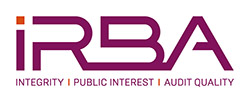21 percent of JSE-listed companies have changed their auditors ahead of MAFR deadline
|
Johannesburg, Monday, October 7, 2019 – With less than four years remaining until the effective date of Mandatory Audit Firm Rotation (MAFR) (1 April 2023), roughly 21% of the JSE Ltd main board listed companies have already voluntarily rotated auditors since the Independent Regulatory Board for Auditors (IRBA) started tracking audit firm rotations in January 2017. This means that these companies which have rotated in the last two years will not need to rotate again until 2027 or 2028. The early adoption of MAFR by companies, indicates that audit committees are paying greater attention to the independence of their auditors. Of the total number of rotations that have taken place since January 2017, 41% of companies cite compliance to MAFR as the reason for appointing new auditors. The second most cited reason was a tender process at 23%. For the remaining companies on the main board, those whose audit firms will have tenure of ten years or more at 1 April 2023 must rotate prior to that date. One of the reasons why the implementation date was set at April 2023 was to provide audit firms and their clients with sufficient opportunity to prepare for MAFR. In 2018, 35 companies changed their auditors in early compliance, up from 18 in 2017. This is a 94% increase year on year. In the nine months to end September 2019, 24 companies have announced a change of audit firm. Says Bernard Agulhas, CEO of IRBA: “What is particularly notable is that we have seen three companies appointing a big four firm together with black-owned next tier firm in a joint audit arrangement. This will help to expose these smaller audit firms to large listed audits and transfer skills. This is a positive step for the development of black firms and will increase access to opportunity, and also prevent the big four firms from simply rotating clients amongst themselves. “Audit committees are encouraged to keep an open mind when appointing auditors. To assist audit committees, some audit firms have published Audit Firm Transparency Reports, which provide insight into their quality management systems, firm structures, and inspection results. The current transparency reporting process is voluntary, and it is expected that mandatory transparency reports for certain firms will be prescribed in future. To assist committees in considering audit quality during their appointment and reappointment decisions, the IRBA has identified a set of Audit Quality Indicators (AQIs). These are a set of comparable measures covering independence, review, workload and training which supports comparison between firms. The AQIs are available from firms and have also been submitted by the firms to the IRBA to enhance its regulatory understanding of quality risks that firms face, and to provide feedback to the market in the form of a feedback report.” From the UK experience, where mandatory tendering is prescribed, there is a significant learning curve for audit committees in this process, as few have experience of running an audit tender process. “What the IRBA does caution against is audit committees which select new auditors on price alone without considering audit quality and the necessary competence and experience for the nature of the work. But audit committees have recognised that of crucial importance to audit quality is auditor independence, and by addressing any long association between the auditor and the client, the company would have gone a long way in securing reliable and credible audit opinions,” concludes Agulhas. Ends Note to Editor:
More about the IRBA: The IRBA is a public protection statutory body established to protect the financial interests of the public by ensuring registered auditors and their firms deliver services of the highest quality. It upholds audit firm independence to ensure that audit quality is such that it enhances the accuracy and credibility of financial performance reporting. In this way, the IRBA has an important role to play in building the reputation of South Africa as an investment market for both local and global investors and driving economic growth for the country. The IRBA also registers suitably qualified accountants as auditors, who must adhere to the highest ethics standards, and promotes the auditing profession through the effective regulation of assurance conducted in accordance with internationally recognised standards and processes.
|





